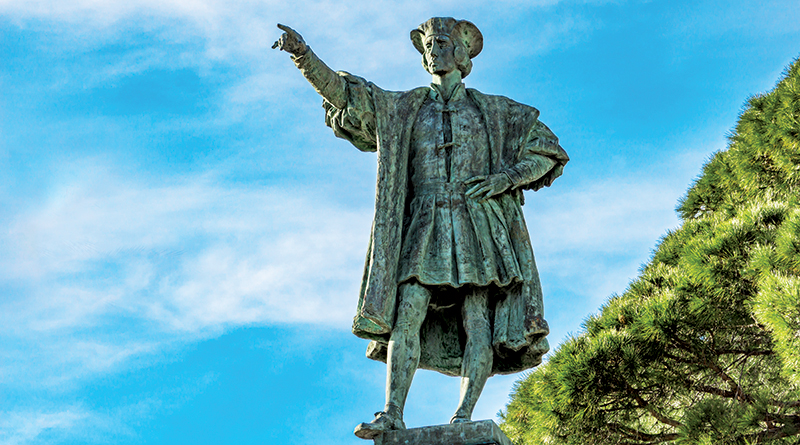Columbus Sailed The Ocean Blue… But Now What?

The phrase, “In fourteen hundred ninety-two, Columbus sailed the ocean blue,” written by Jean Marzollo, is a popular rhyme used as a mnemonic device to help students remember the year Christopher Columbus is said to have arrived in the Americas. But historians today have made their own discoveries disproving many myths associated with Columbus.
His name was Cristoforo Colombo, which was later anglicized to Christopher Columbus. The explorer made four voyages to the Americas not three, in 1492, 1493, 1498 and 1502, the last one ending with Columbus and crew shipwrecked and marooned on Jamaica for months.
While he explored the Caribbean, South America and Central America, he never landed in North America. His 1492 voyage is well-known for landing in the Bahamas, which he called San Salvador.
Columbus underestimated the Earth’s circumference and the size of the oceans. Despite this, his voyages initiated a period of rapid colonization, exploration and exploitation in the Americas.
Although Columbus’s voyages are often celebrated for their role in connecting the Old World and the New World, they also had significant negative consequences, including the exploitation and mistreatment of indigenous peoples and the introduction of diseases that decimated their populations. He also reportedly introduced the use of tobacco in Europe.
While the second Monday in October has historically been celebrated as Columbus Day and is still federally recognized as such, many have pushed for moving away from the holiday. In April of this year President Donald Trump said he would not follow President Joe Biden’s 2021 proclamation of recognizing Indigenous Peoples Day alongside Columbus Day. However, his vow to restore Columbus’ reputation faces an uphill climb. Many believe the explorer’s reputation was pretty much destroyed during his own lifetime.
Only 16 states and the territory of American Samoa still observe the second Monday in October as an official public holiday exclusively called Columbus Day. (“Official public holiday” typically means government offices are closed and state workers, except those in essential positions, have a paid day off.) In four states, two territories and Washington, D.C., the day is an official public holiday but goes by a different name. Four other states and the U.S. Virgin Islands mark the day as both Columbus Day and something else. And in 26 states and the territory of Guam, the second Monday in October is pretty much like any other workday.
The question of whether to celebrate Columbus Day is complex, with arguments for and against the holiday’s continued observance. Some argue that it commemorates the start of cultural exchange between Europe and America, while others view it as a celebration of colonization that overlooks the harm done to indigenous peoples. Many states and cities have replaced Columbus Day with Indigenous Peoples’ Day, reflecting a growing recognition of the history and contributions of Native Americans.
Columbus Day is one of the most inconsistently celebrated U.S. holidays. It’s one of 11 official federal holidays, which means federal workers get a paid day off and there’s no mail delivery. Because federal offices will be closed, so will most banks and the bond markets that trade in U.S. government debt. The stock markets will remain open, however, as will most retailers and other businesses.
Beyond that, Columbus Day seems to be fading as a widely observed holiday, having come under fire in recent decades from Native American advocates and others who’ve argued that Christopher Columbus isn’t an appropriate person to celebrate.
States that have not officially observed Columbus Day include Alaska, Hawaii, Iowa, Louisiana, Maine, Michigan, New Mexico, Oregon, South Dakota, Vermont, Washington, D.C., and Wisconsin. Some states like South Dakota and Washington, D.C. officially celebrate Indigenous Peoples’ Day instead. In the states of Delaware, Oregon and Washington, Columbus Day is not an official holiday. Iowa and Nevada do not celebrate Columbus Day as an official holiday, but the states’ respective governors are “authorized and requested” by statute to proclaim the day each year.
The states that are celebrating Indigenous Peoples’ Day on the second Monday in October are honoring Indigenous American peoples and commemorating their histories and cultures. It’s an official city and state holiday in various localities. It is celebrated as an alternative to Columbus Day, citing the lasting harm Indigenous tribes suffered because of Columbus’s contributions to the European colonization of the Americas.
Depending on where in the United States people live and whom they work for, Columbus Day may be a day off with pay, another holiday entirely, or no different from any other Monday. In Indiana, Monday, October 13, will be observed as both Columbus Day and Indigenous Peoples Day.
In Canada, however, Thanksgiving is celebrated on the second Monday of October, while Columbus Day is not a national holiday. Canada’s Thanksgiving, a day to give thanks for the harvest.
- The Beginning Of St. Therese Church In Waynedale - February 13, 2026
- The Mail Must Go Through! - January 30, 2026
- What’s New In The New Year? - December 19, 2025


